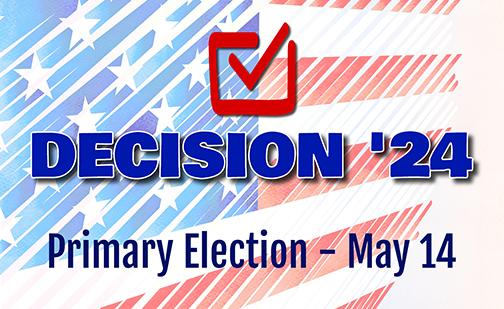Seeman says he believes local sentiment has changed since 2012 decision to end tax
Citizens of Aurora will be asked in May to vote yes or no on the issue of implementing a 1-1/2 percent city sales tax.
Mayor Marlin Seeman explained the rationale and timing behind the resolution in February, defining the proposal as a tax shift from a reliance on property taxes to a sales tax. He suggested that a 1-1/2 percent sales tax, if approved by a simple majority vote, could help the city fund operations in five specific categories, including public safety, property tax relief, recreation, civil and social activities, and economic development involving expansion and rehabilitation of local infrastructure.
Based on a 2023 report from the Nebraska Department of Revenue, listed on its website, Aurora’s net taxable sales for 2023 was $67,236,122. A 1-1/2 percent sales tax would generate $1,008,541 on that same total. If approved, a local sales tax would become effective Oct. 1, 2024.
“I know that there are people in town who are going to dismiss a sales tax as being a negative event in Aurora and I’m understanding of that,” he said. “But I look at it as what is the best way for people to contribute to the cost of government without excessively damaging their financial structure in their home. Are property taxes socially acceptable? Well, it’s the way we’ve done it for 150 years, but is it better if we take the sales tax and let them decide who gets the 1-1/2 percent that pretty much everybody is going to collect? That’s where I see this whole push and shove going.”
The city implemented a 1 percent sales tax in 2009, though voters opted to reverse that decision three years later. Seeman said the timing of a proposal to re-implement a citywide sales tax is due in part to what he called Gov. Jim Pillen’s mandate to decrease property taxes.
“In the climate that we’re in we as a city have to constantly look at what the legislature gives us,” Seeman said, referring to Gov. Pillen’s proposed tax management legislation. “We know the governor’s goal is to reduce property tax dependence in Nebraska by 40 percent. I think he’s had to modify that because of the economic reality in state government, but as of the last version of this bill (LB 388) he is doing nothing to offset property tax requests by the county or the city, even though we thought we were going to get a benefit. And so what the governor is saying is I do not want you to rely on property taxes. Regardless of how the bill turns out there is going to be a restriction on the ability to grow or manufacture funds from property taxes, and he favors a sales tax.”
That, Seeman said when asked about the timing of the proposal, is the reason he believes the City of Aurora needs to be proactive. He said it’s also the reason the sales tax resolution includes a provision to increase the city’s budgeted restricted funds for fiscal year 2024-25 by $1 million, which represents a 23.57 percent increase over the current year’s restricted funds budget.
“We need to let the citizens in May look at the governor’s encouragement and Sen. Friesen’s encouragement for eight years,” he explained. “They’ve been challenging government like us to reduce our reliance on property taxes and replacing that with sales tax, basically because that’s the only other option we have because we don’t have the ability to generate income tax.”
City audit
Seeman sat down for an ANR interview on the sales tax issue the day after the city’s auditor told the council that its cash reserves are dwindling. (See related article on Page A1). That, he said, makes the question of “Why implement a sales tax now” very timely.
“We’re reaching the point where we’re using funds that we have been keeping available to us over time to fund all or any part of those five priorities that government does,” he said. “Our audit told us last night that we have changed the financial structure of the city by spending down some of those stored reserves, so we need to think about how we’re going to rebuild them. I didn’t know what he (the auditor) was going to say last night, but obviously he was impressing on the council that they needed to consider the role of other tax sources, which the one principally available for city government is a sales tax.”
Seeman said he does not want to see the city put in a position where it can’t perform the five functions of local government.
“The cash reserves dwindled,” he confirmed. “We’ve put over $1 million in economic development in the last year and that money had to come from your house because we don’t have anything else to tax. The benefit of us investing in economic development means that we increased our debt, but we also increased our tax base. My dream is one that we would say that we basically draw off from property taxes kind of a level amount out into the future, and then expenses that occur through inflation, or increased production of necessary items in these five categories, are paid for with sales tax.”
‘A golden era’
The mayor went on to say that in his view Aurora is in “a golden era of economic development,” with several growth projects involving both housing and business opportunities. Though exciting for the community, he said that growth comes with up-front costs that must be funded somehow.
“Well, we bought a bunch of that,” he said of the city’s role. “Why? Because it benefits everybody. But again, it’s your house that’s going to pay or your building that you have in the business that’s going to pay 100 percent.
“And so, economic development has bled money out of our fund,” he continued. “EMS has bled money out of our fund. The parks and recreation, probably all these necessary services have, through inflation, caught us and the city council has chosen not to increase the mill levy significantly.”
Utilizing a sales tax approach to help fund local government, Seeman said, is one way of mitigating a reliance on property taxes.
“I prefer that Americans have the right for their own decision making to pay for government, so that’s kind of where this comes from,” he explained.
Regressive tax?
Seeman noted that local voters opted to discontinue the sales tax in 2012 after just three years, recalling the narrative at that time was that a city sales tax is a regressive form of taxation. He said since that time he believes the local sentiment has changed, sharing an anonymous letter which emphasized that point. In that letter, a local resident referred to the steady stream of traffic at Love’s Travel Stops and Arby’s as “an untapped gold mine” of revenue for the city.
“The compelling argument was that a sales tax was regressive,” he said. “I just think the analogy is that the ability to pay is not a formula in property taxes so the governor is saying we need to roll that back because it’s philosophically his opinion that we are probably over dependent on that in all political subdivisions. The opposite of that, and why the sales tax is so valuable to citizens of Aurora, is that a sales tax is 100 percent controlled by the citizen. If I decide that I’m going to go to Grand Island and buy a taxable product, I make a personal management decision that I have the financial ability to buy that item, so I am in control of how much I pay somebody’s taxes.
“With property taxes I have no control,” Seeman continued. “I am assigned a value that I have to pay. The sales tax doesn’t take from me anything that I’m not willing to buy. The bottom line is I am going to advocate to the city council at the end of the time period, which is called a budget year … that people who have chosen to invest in Aurora will in fact reduce their dependence on our dependence on property taxes.”
That tax shift, Seeman said, is one he believes voters in Aurora should support.
“So the vision I have is that if we say that we have the sales tax to suppress property taxes, which is what they’ll do, I can then say, okay, we’re only going to draw a certain amount of dollars from property taxes,” he said. “We’re going to limit it by infusing the sales tax into that total cash pool that property tax would have had to pay. That would mean the mill levy would settle on an annual basis to reflect the increased amount of property taxes that are being paid by all of this economic development coming in. We can lower the property taxes because sales tax is going to push it down because they’re going to be part of that total amount of funds it takes to operate the city.”
Public safety issue
Seeman said if local voters look at the sales tax option as a property tax reduction, the first thing the city will do is spend that new source of revenue on elemental services, including public safety.
“A sales tax could be used to guarantee the stability on the transfer of the EMS from the county,” he said. “We believe, and even the hospital will say, that without assistance you can’t make money because it’s just the nature of healthcare that you provide equal service to everyone. When EMS picks up a person we don’t ask them for a credit card on their chest, though literally there are places that do that if you want to get treated. We don’t do that. The City of Aurora is not in that business of making judgment because of your ability to pay versus your willingness to pay.”
LB 840 not considered
Asked if city leaders considered LB 840, a form of sales tax implementation which requires governmental entities to specifically designate how sales tax money will be spent, Seeman said no.
“LB 840 is not one that we considered because what we’re doing is literally giving our economic development engine as much money as we can upon request,” he explained. “I look at this and say, ultimately, it’s going to be on a case-by-base basis. LB 840s are directly related to a not-for-profit model of economic development, either one that is managed by the city itself or by a group managed by and operated in conjunction with the city. We didn’t want to encumber the Aurora Development Corporation by putting them in a position where every decision they made became a public decision.”
Seeman went on to list a number of reasons he believes a vote in favor of the sales tax is a positive step forward for the City of Aurora:
* “Everybody’s talking about the possibility of a motel coming in because we need one desperately. You know, what if there’s some money in there to offset some of those costs of that infrastructure because that’s what we can do. This can offset the investment in the future that we’re making today.”
* “If the city could provide additional funds to a senior center that provides morning coffee, morning exercise, morning social time, arts and crafts and a place for commodities and things like that, and if a sales tax could increase the kinds of gifting that the city council could choose to give them, I think that’d be really valuable.”
* “The example I use is if property taxes were to be reduced by $300 on your house for the city, and I know that’s a modest number, it would take $20,000 worth of investment of your money that you choose to spend, whereever you choose to spend it at 1-1/2 percent, to spend more than the $300 that your house is going to pay.”
* “Our budget has thousands of dollars in there to support nonprofits. If you put property tax, sales tax and donations into the pot, you suddenly have the ability to perform at the highest quality levels that are expected by the citizens of Aurora. They don’t expect second rate and I would never want to be part of a second rate or deferred maintenance facility.”





